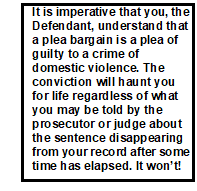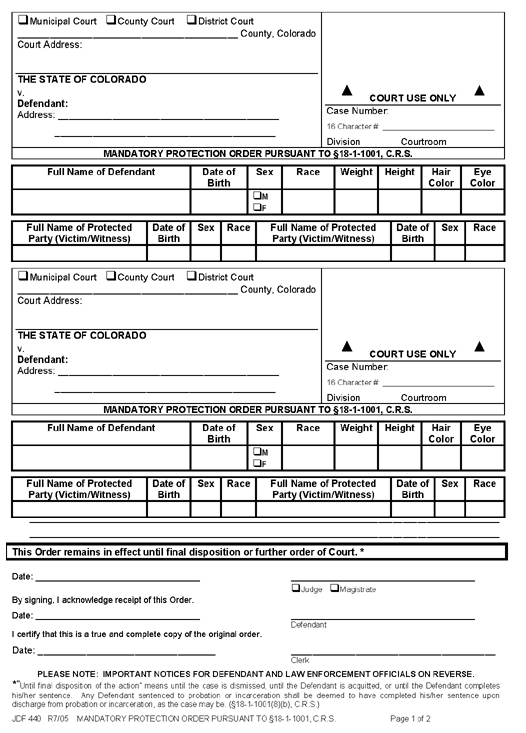
Reviewed by Charles E. Corry, Ph.D.
This site is copyrighted, supported, and maintained by the Equal Justice Foundation.
| EJF Home | Join the EJF | Comments? | Get EJF newsletter | Newsletters |
| DV Home | Abstract | Contents | Tables | Index | Bibliography |
| Chapter 1 — Charged With Domestic Violence? |
| Next — Penalties for a domestic violence conviction |
| Back — What happens when 911 is dialed under Colorado law |
What follows is a reproduction of the mandatory protection order that will be imposed upon you if you are charged with domestic violence in the State of Colorado.
Ordinarily
you will be held without bail
until a hearing can be held before a magistrate,
even if that time exceeds 48 hours.
By a hearing, what the legal system means is that you should enter a plea of guilty.
They do not want to hear your side of the incident.
In fact, you are much better off to remain silent, just like in the cop movies. The prosecutor will lie and the judge certainly will not inform you of the pains and penalties associated with a guilty plea
(and a plea bargain is a plea of guilty)
as required under
C.R.S. § 16-7-207.

You will be made to sign the following protection order before you are released from custody C.R.S. § 16-4-103 (2). All of the boxes will be checked before you are set free. You cannot be released, i.e., a summons issued in lieu of arrest, at the scene of the alleged crime C.R.S. § 16-3-105.

THIS ORDER IS IN EFFECT UNTIL THE DISPOSITION OF THIS ACTION, OR, IN THE CASE OF AN APPEAL, UNTIL THE DISPOSITION OF THE APPEAL.
This Order is accorded full faith and credit and shall be enforced in every civil or criminal court of the United States, an Indian tribe, or a United States territory pursuant to 18 U.S.C. Sec. 2265. The issuing court has jurisdiction over the parties and subject matter. The Defendant has been given reasonable notice and opportunity to be heard.
• A knowing violation of a Protection Order is a crime under §18-6-803.5, C.R.S. A violation may subject you to fines of up to $5,000.00 and up to 18 months in jail. A violation will also constitute contempt of court.
• You may be arrested without notice if a law enforcement officer has probable cause to believe that you have knowingly violated this order.
• If you violate this Order thinking that a victim or witness has given you permission, you are wrong, and can be arrested and prosecuted.
• The terms of this Order cannot be changed by agreement of the victim(s) or witness(es). Only the Court can change this Order.
• You may apply at any time for the modification or dismissal of this Protection Order.
• Possession of a firearm while this Protection Order is in effect may constitute a Felony under Federal Law, 18 U.S.C. §922(g)(8).
NOTICE TO LAW ENFORCEMENT OFFICERS
• You shall use every reasonable means to enforce this Protection Order.
• You shall arrest, or take into custody, or if an arrest would be impractical under the circumstances, seek a warrant for the arrest of the Defendant when you have information amounting to probable cause that the Defendant has violated or attempted to violate any provisions of this Order and the Defendant has been properly served with a copy of this Order or has received actual notice of the existence of this Order.
• You shall enforce this Order even if there is no record of it in the Protection Order Central Registry.
• You shall take the Defendant to the nearest jail or detention facility utilized by your agency.
• You are authorized to use every reasonable effort to protect the Protected Parties to prevent further violence.
• You may transport, or arrange transportation to a shelter for the Protected Parties.
• You may request the prosecuting attorney to initiate contempt proceedings against the Defendant.
Click here for complete copy of standard form JDF 440 in Adobe Acrobat (PDF) format.
Click here for other protection order forms and instructions.
1. When charged with domestic violence, arrest is mandatory C.R.S. § 16-3-105 (1.5) and C.R.S. § 18-6-803.6.
2. The police need not obtain a warrant for your arrest under C.R.S. § 18-6-803.6 even if you are not present when they arrive and they find you days later.
3. The police need not witness any crime and may use hearsay to make a warrantless arrest and search.
4. Without limit, any other order the court deems appropriate to protect the safety of the alleged victim may be imposed on you prior to a trial C.R.S. § 16-4-105. These may include, but are not limited to:
(I) Periodic telephone contact with the defendant by the police or other agency. This is very likely whether or not the court orders it.
(II) Periodic office visits by the defendant to the pretrial services program.
(III) Periodic home visits to the defendant's home (note that the defendant has probably been ordered to vacate his “home” and may be living on the streets or, at best, in a motel).
(IV) Periodic drug testing of the defendant.
(V) Mental health or substance abuse treatment for the defendant including residential treatment.
(VI) Domestic violence counseling for the defendant.
(VII) Electronic (GPS) monitoring of the defendant.
(VIII) Pretrial work release of the defendant.
Note that items (I) through (VIII) are exactly the same as the likely punishment that will be imposed if you are found guilty. Thus, you are presumed to be guilty and the punishment precedes the trial. If you are found innocent you will already have been punished. You will also be ordered to pay for your punishment whether or not you are convicted.
5. Mediation of the issues was expressly denied in C.R.S. § 19-3-310.5 (II) for cases where domestic violence is charged but that section was repealed effective July 1, 1999. Despite the repeal, mediation is still forbidden in all jurisdictions we are aware of.
6. If you appeal for any reason, the protection order remains in effect until final disposition of the appeal C.R.S. § 18-1-1001.
7. Last, but far from least, from the time the protection order is imposed until it is cleared from all databases it is a violation of Federa l law 18 U.S.C. § 922(g)(8 and 9) to purchase, acquire, or be in possession of firearms or other dangerous weapons, e.g., swords, grenades, explosives, ammunition, etc. This is a felony with a mandatory minimum of 5 years in prison if convicted.
Collectors items are held to be in this category as well. “In possession” generally means in the same room as, or in close proximity to. If you are visiting a friend and they have a gun collection, you are in violation and could be sentenced to five years (minimum) in prison.
Thus, if you have a gun collection, swords, etc., the Bureau of Alcohol, Firearms, Tobacco, and Explosives (BATFE) approved method of storage after issuance of a protection order or being charged with domestic violence is with an attorney, with the police or sheriff, or with an approved firearms dealer. Have a friend or relative collect them for you and remove them to an approved storage location until after you are sure the protection order has been lifted and your name removed from the state and federal databases. That will usually require a separate motion to the court or personally carrying a certified copy of the court order of dismissal to a Colorado Bureau of Investigation office.
As a safety measure you should have a gun dealer run a check on you after the order is dismissed to be absolutely sure your name has been removed from all databases.
8. In one of the many shams associated with current practice in domestic violence, if a man pleads guilty or accepts a plea bargain, the mandatory protection order is often dropped and he is free to return home. However, if he pleads innocent, the protection order is kept in place until the trial months later. Thus the innocent are punished while the guilty go free.
| EJF Home | Join the EJF | Comments? | Get EJF newsletter | Newsletters |
| DV Home | Abstract | Contents | Tables | Index | Bibliography |
| Chapter 1 — Charged With Domestic Violence? |
| Next — Penalties for a domestic violence conviction |
| Back — What happens when 911 is dialed under Colorado law |
This site is supported and maintained by the Equal Justice Foundation.